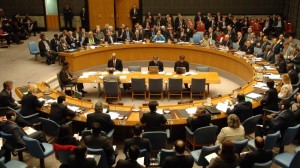 United Nations Security Council in session (file photo)[/caption]
United Nations Security Council in session (file photo)[/caption]Saudi Foreign Minister Prince Saud al-Faisal and U.S Secretary of State John Kerry discussed on Monday issues that led Riyadh to snub a much coveted U.N. Security Council seat over what it described as �double standards� at the U.N. body.
Their discussions took place after Faisal hosted a lunch for Kerry at his private residence in Paris, Reuters reported.
�We expect they�ll have a substantive, a far-ranging conversation about all of those issues, areas where they disagree, areas where perhaps we can come closer together,� Reuters quoted a senior State Department official as saying before the lunch.
While both Washington and Riyadh shared the goals of a nuclear-free Iran, an end to Syria�s civil war and a stable Egypt, they do not agree on how to reach them, U.S. officials told Reuters.
On Friday, Saudi Arabia said U.N. inaction over Syria�s 31-month conflict had compelled it to reject the two-year term on the council in an unprecedented move.
One official, who spoke to Reuters under the conditions of anonymity, said Kerry would not try to persuade the Saudis to reverse their rejection of the seat but would cite the advantages of being on the 15-member body, which can authorize military action, impose sanctions and set up peacekeeping operations.
�It does give you a voice even when you have frustrations,� the U.S. official said. �It�s their decision to make.�
The council has been paralyzed the Syriam conflict, with permanent members Russia and China repeatedly blocking measures to condemn Syrian President Bashar al-Assad, a longtime ally of Riyadh�s regional arch-rival Iran.
However, Riyadh�s frustration with Russia and China now extends to the United States, not only over Syria, but also over Washington�s acquiescence in the fall of Egypt�s Hosni Mubarak in 2011 and its new quest for a nuclear deal with Iran.
The United States dropped a threat of military strikes against Syria in response to a poison gas attack in Damascus in August after President Assad agreed to give up his chemical arsenal.
Saudi Arabia was also concerned about signs of a tentative reconciliation between Washington and Tehran, something Riyadh fears may lead to a �grand bargain� on the Iranian nuclear program that leaves it at a disadvantage.
While the Saudi stance won praise from its Gulf Arab allies and Egypt, the Arab Group at the United Nations urged Riyadh on Saturday to reconsider its decision.
�We hope that they (Saudi Arabia), which are amongst the blessed who represent the Arab and Islamic world at this important and historical stage, specifically for the Middle East region ... maintain their membership in the Security Council,� Reuters quoted the Arab Group�s statement as saying.
The Arab Group includes Arab U.N. member states with the exception of Syria, whose membership was suspended when it was frozen out of the Arab League.
The group appealed to the kingdom to �continue their brave role in defending our issues specifically at the rostrum of the Security Council.�
By Al Arabiya
The Iran Project is not responsible for the content of quoted articles.










